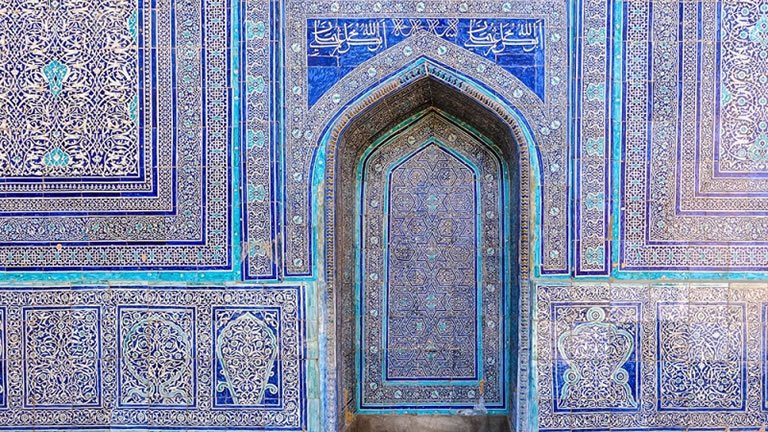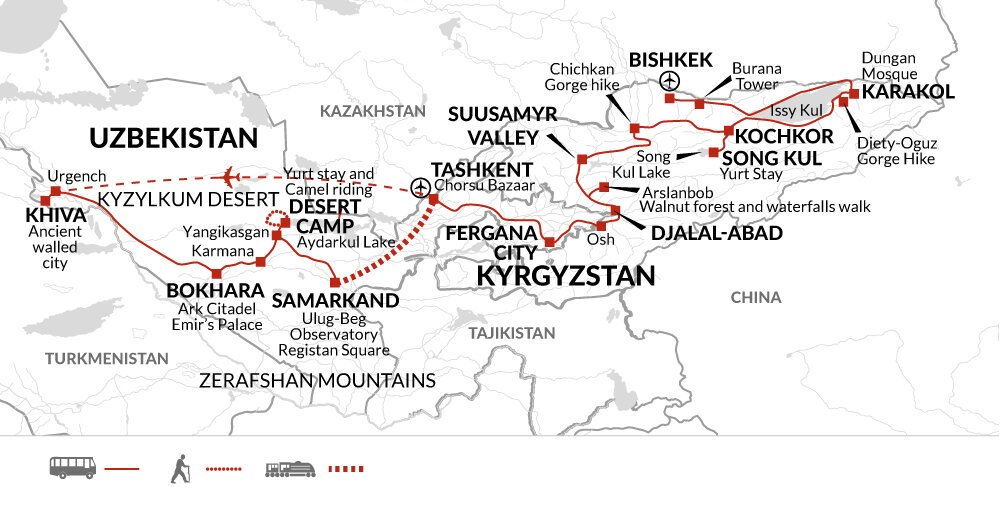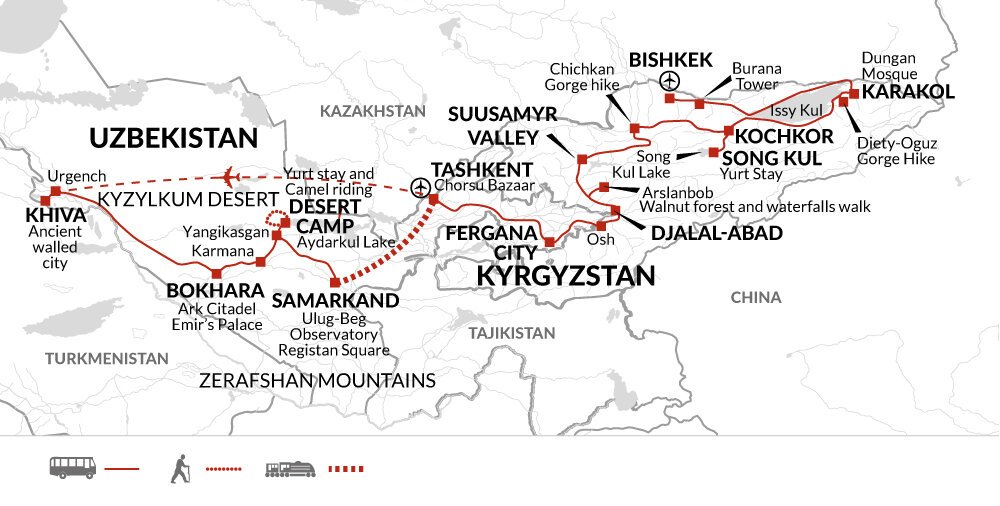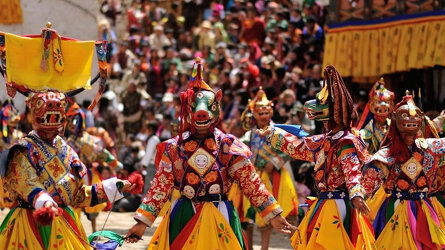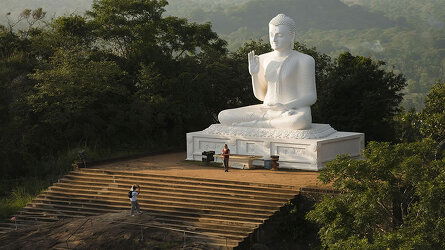Overview
Itinerary
Arrive in Bishek, a former Silk Road settlement. Kyrgyzstan's capital is a young city, starting life as a clay fort built by the Khan of Kokand in 1825 only to be destroyed by the Russians 43 years later. It was rebuilt in 1878 and it is from this time that Bishkek evolved.
For those arriving on time today our Leader plans to meet you in the hotel reception at 11am for the welcome meeting and to take us on the sightseeing tour, which is by bus and on foot. We learn about the main monuments and buildings of the city, and take a leisurely walk through Oak Park.
If you would like an airport transfer today, you'll need to arrive into Manas International Airport (FRU), which is 50 minutes' from the hotel. For those arriving on flights in the early hours of this morning, we'll arrange for your hotel room to be available immediately upon your arrival. For anyone arriving before today please contact us to book additional nights accommodation.
Please note that if you wish to join the Bishkek City Tour today, you must arrive at the hotel by 11am. If you are booking your own flights, we recommend giving yourself at least one hour to clear the airport. From the airport to the hotel is around 40 minutes' drive, so therefore the latest your flight can arrive is 9am. Should you miss the welcome meeting, your Leader will inform you of any essential information at 6pm. Stay: Asia Mountains 1 Hotel (Simple)
Leaving behind the city we head into the heart of this small nation. At its centre lies Issyk Kul Lake, surrounded by the Tien Shan Mountains. Along the way we visit the Burana Tower, all that remains of the ancient city of Balasagun. The tower is believed to be the oldest minaret in Central Asia with a detailed external pattern of relief work in brick.
We also see the petroglyphs in Cholpon-Ata where stones vary in size from 30cm to 3 metres. Ancient drawings on the stones date from the 7th century BC to the 3rd century AD, many of them figures of hunters, ibex, goat and reindeer. From here we are also afforded with views of Issyk Kul Lake. We then follow the shore along the north of the lake arriving in the evening in the city of Karakol. Strategically located this was once a Russian military outpost, and the gateway of expeditions into the Tien Shan and beyond. This evening we enjoy a meal cooked by a family from an ethnic minority group, either Dungan or Uygur; both groups are Muslim people of Chinese origin. We not only sample their hospitality but also learn about the traditions and lifestyle. Stay: Altamira Hotel (Simple) (B/D)
The great Russian explorer Prjevalsky died in Karakol before an expedition to Tibet and the small museum dedicated to him gives a great insight into the 19th century Central Asian explorers. In the city we have the opportunity to see the Chinese influence at the Dungan mosque built in 1910 in the style of a Buddhist pagoda (it is made of wood without any nails) whilst the strong Russian influence is evident at the Orthodox Cathedral.
After sightseeing in the morning we drive to visit the Valley of Seven Bulls, at Djety-Oguz, where large red sandstone rock formations tower over the valley. During Soviet times this area become known as a health retreat, the sanatorium remains. It became famous when after his first flight in space Yuri Gagarin came here to decompress. Stay: Altamira Hotel (Simple) (B)
We continue along the southern shore of Issyk Kul Lake where we make a stop for the opportunity to take a bracing dip into the cold waters of the lake. Continuing on we stop again to view the waterfalls within the dramatic 10km long Barskaun Gorge, as well as having an opportunity to spot birds whilst we enjoy a river-side picnic. Our final destination is Kochkor, a typical Kyrgyz town where we spend the night in local guesthouses, a great way to get to know the locals. Depending upon size we may find the group split between guesthouses. Stay: Kochkor Family Guesthouse (Simple) (B/D)
The women of the town are famous for felt-making and this morning we have the chance to see how 'shirdaks', traditional felt applique rugs, are made by hand. We then set off along a dramatic mountain road via Kalmak-Ashu Pass at a lofty 3346m where we can drink in our epic surroundings as we journey to Song Kul. The lake itself is spectacular and the second largest in Kyrgyzstan, situated at an altitude of 3013m above sea level. Surrounded by dramatic snow-covered mountain peaks, it is hidden in a flat, plate-like 'jailoo' (the Kyrgyz word for mountain pasture) which is covered in Edelweiss flowers at certain times of the year. In the summer the shepherds drive the livestock (sheep and/or horses) up into the mountains for pasture and establish a camp for the season.
After settling into our yurts, we will have the opportunity to relax and unwind or perhaps go on a pleasant walk by the lake. Yurts are circular dwelling structures made from felt and insulated with sheepskins, traditionally made to be portable and accommodate 5-6 people. Basic long drop toilets are available in a separate building along with an outdoor basin for washing and are shared with the camp. The experience is very basic, however, gives a unique insight into how local nomads traditionally live and allow us to wake up the next morning in the middle of nowhere. Stay: Song Kul Lake Yurt Camp (Simple) (B/D)
This morning you may choose to relax by the lake, or depending on weather conditions, it may be possible to take a hike into the mountains surrounding the lake. Leaving the camp we walk along grassy, undulating slopes through the Moldo-Toor range. Song Kul Lake offers a spectacular backdrop to the north and we hope to meet locals along the way to get a further glimpse into this traditional lifestyle. The walk takes around 4 hours and reaches an altitude of 3300m. After lunch we leave our yurts and make our way to back to Kochkor for the night, this time taking a different route crossing the Teskey-Topok Pass, arriving in town in the late afternoon. This evening we head out to enjoy a musical Folklore ensemble performance with a wide repertoire of traditional ballads, love songs, work songs and lullabies, accompanied by Kyrgyz national instruments. Stay: Kochkor Family Guesthouse (Simple) (B/D)
We spend the day on the road driving through the wild mountain scenery of the inner Tien Shan Mountains as we make our way west. Our drive takes us along the stunning Suusamyr valley, which is situated at an altitude of 2000-3200m between the dramatic ridges of Kyrgyz and Talas Ala-Too and stretches for some 155km. During the summer alpine grasses cover the whole valley, whilst the winter months see it blanketed with snow. There will be plenty of stops for photo opportunities along the way as we make our 320km journey across the passes to Suusamyr Valley. Stay: Baytur Resort (Simple) (B/D)
After breakfast we set off on a scenic drive along the Ala-Bel pass (3175m) before following the course of the Chichkan River to the junction with its tributary, the It-Agar River. From here we start a mostly easy walk on an earth trail which is stony in some sections. The path follows the It-Agar River for about three kilometres uphill, before arriving at the small, but impressive and beautiful alpine Lake of Saz Kul. The walk is around two hours up and one hour down. After some time enjoying this picturesque place we drive along a winding road that follows the Naryn River all the way to the Toktogul Resevoir, the largest reservoir in all of Central Asia and our base for the night. Stay: Kok-Bel Hotel (Simple) (B/D)
Today we leave Toktogul and again drive through the wild landscapes that make Kyrgyzstan such a memorable place to visit. Our destination is Djalal-Abad, located at the north-eastern end of the Fergana Valley and nestled in the foothills of the Baba Ata Mountains. The city is well-known for its spas and is responsible for producing several brands of mineral water sold across Central Asia. It is an also important agricultural hub, providing the majority of the fruit and vegetables for the region. Upon arrival, the rest of the afternoon is free to either explore or to relax after the day's drive. Stay: Rosa Park Hotel (Simple) (B)
We start the day travelling 90 kilometres north to the charming village of Arslanbob. Here we spend the day accompanied by a local guide, walking through the walnut groves of Arslanbob sometimes referred to as 'The Royal Woods of Kyrgyzstan'. The trees can reach 30 metres and grow wild on mountain slopes, and walking through the grove rewards us with spectacular views. We will also come across a beautiful 23 metre high waterfall nestled deep in the forest. The walk will take around three to four hours and is graded as easy, with no significant ascents or descents. Later in the afternoon we will make our way back to Djalal- Abad. Stay: Rosa Park Hotel (Simple) (B)
Leaving Djalal Abad behind we make our way into the expansive Fergana Valley and past the city of Osh, which according to legend was founded by either King Solomon or Alexander the Great! Although it dates back to the 5th century BC, very little remains to suggest its ancient past and today, it is Kyrgyzstan's second city and very much soviet in feel.
We then make our way to checkpoint 'Dostlik', on the Kyrgyz-Uzbek border, where we undergo immigration and customs formalities and bid farewell to our Kyrgyz leader as we are handed over to our tour leader from Uzbekistan. From the border we drive to our overnight stop in Fergana City. Stay: Terra Nova Hotel (Comfortable) (B)
This morning we head out to start the final leg of our journey. We must travel by convoy of smaller vehicles as we cross over Kamchik Pass at 2300m. We make a stop at Rishtan town, famous for its ceramics, where we visit a workshop. The Silk Road introduced Chinese ceramics to Uzbekistan, and while craftsman initially emulated Chinese designs, they soon evolved their own, now traditional, Uzbek geometric style. Later we make a brief stop in Kokand town, the former residence of Kokand Khan, before finally arriving in Tashkent. Stay: Hotel Panarams by Radisson Individuals (Comfortable) (B)
This morning we head out with a local guide to explore Tashkent, the capital of Uzbekistan, which has been on this site for over 2000 years. Although much of it was destroyed in the earthquake of 1966 it has been rebuilt as a modern model city, with spacious avenues and ever-present fountains to cool the air. Our sightseeing tour includes various points of interest around the city, like the Independence Square, Navoi Theatre, Old City, Abu Khasim Madrassah and the Earthquake Monument. We also take a ride for 2-3 stops on the Tashkent Metro, which boasts some flamboyantly decorated stations. The afternoon is free. Stay: Hotel Panarams by Radisson Individuals (Comfortable) (B)
Today, we have a little free time to explore more of the city before our flight to Urgench in the early evening. A further 40-minute bus journey will take us to the remarkable ancient city of Khiva, which will be our base for the next two nights.
The early history of this area is sketchy. We do know that, by the time the Arabs arrived in the 8th century, Khiva was one of three important cities which dominated the region. The city's strategic location on the Volga branch of the Silk Route made it a much sought-after imperial asset, with the British and Russians vying for sovereignty throughout the 19th century as part of the 'Great Game'. In 1873, it fell to the Russians as both Samarkand and Bokhara had already done. A 1970s Soviet conservation programme restored much of the city, turning it into what is effectively an open air museum. Stay: Feruzkhan Hotel (Comfortable) (B)
On this morning's walking tour, we may well feel like we are stepping into a scene from the film 'Arabian Nights' as we explore the majestic Old Citadel. This 12th century fortress dominated the city before a palace, harem, barracks and mosques were constructed. It is worth climbing the steps of the Dzhuma Minaret for a panoramic view of the maze of streets below.
The rest of the afternoon has been left free to explore the mosques, tombs and palaces of this well-preserved city, which has hardly changed since ancient times. This evening, you may choose to explore a bit more of the city after dark, when magical moonlit silhouettes make it even more spectacular. Stay: Feruzkhan Hotel (Comfortable) (B)
Today's drive to the fabled city of Bokhara will take up the day, but is broken up with plenty of stops as we travel through expansive plains and past old caravanserais. As home to the famous Islamic poets, Firdausa and Rudaki, Bokhara is considered by some to be the 'Bastion of Islam'. The town retains much of its Uzbek character and has more than 140 unique monuments. We will spend the next three nights here to explore this fabulous city. Stay: Royal Bukhara Hotel (Comfortable) (B)
Today's day of sightseeing starts off with a walking tour. Highlights include the Lyab-i Hauz which once supplied the city's water; the striking blue-tiled Abdul Khan madrassah and the 9th century Mghoki Arrar Mosque. We will also visit the Kalyan minaret, which, as the tallest monument in town, is known as the 'Tower of Death' because prisoners were once hurled to their death from here. In addition, we will take in the trading domes that are the most famous symbol of Bokharan architecture.
This afternoon, we will drive to The Ark - a massive citadel which was used as a fortress from the 5th century until its fall to the Russians in 1920. Today it houses several small museums connected with Bokhara's history. Bokhara was the site of the imprisonment for two British soldiers during 'The Great Game' - an epic battle fought between Victorian Britain and Tsarist Russia across the vastness of Central Asia.
We also plan to visit the summer palace of the Emirs of Bokhara, which is known as the 'Palace of Moon-like Stars'. Here, we will see the famous White Hall, which took 30 architects two years to construct. Finally, we will take in the Char Minar Mosque - the impressive entrance to a now-demolished madrassah, and wander the backstreets of the old town maybe stopping off at a 'chaikhana', a local tea house. Stay: Royal Bukhara Hotel (Comfortable) (B)
Today has been left free for you to spend as you wish. You may choose to climb the 46 metre-high Kalyan minaret for stunning views over the city. Alternatively, you may like to explore the Taqi-Sarrafon market - one of the four domed bazaars in Bokhara. Used as a money exchange during the height of the Silk Road, it is now home to plenty of souvenir shops. Stay: Royal Bukhara Hotel (Comfortable) (B)
This morning, we will drive a short distance to Gijduvan - a town celebrated for its crafts and trade since the 10th century. Here, we will visit the famous ceramic centre. Our next stop is Karmana, where we plan to visit the 10th century Mir-Said Bakhram Mausoleum. Heading off the main highway, we continue our journey north across the desert to Nurata. Famous for its sacred Chashma Spring, the town attracts visitors from across the Islamic World. According to legend, this healing spring, containing gold, silver and bromide, was formed by a meteorite hitting the ground. Whilst in Nurata, we plan to have lunch in a local house and see the remains of Alexander the Great's Karazy Fortress, affording excellent views of the desert landscape.
This afternoon, we head to our overnight base in Yangikasgan, where we have the opportunity to go on a short optional camel ride, or simply relax and take in the remote surroundings. Tonight's desert camp accommodation is in yurts, typical of those used by the nomadic people of Central Asia. Yurts are circular dwelling structures made from felt and insulated with sheepskins, traditionally made to be portable. The yurt camp consists of 20 traditional felt yurts each accommodating sleep five people. Mattresses, pillows, linen, blankets and towels are provided. There are 8 shower, 4 (western style) WC cabins and 2 wash basins. Each yurt is equipped with a 220v / 50Hz power socket and an electric lamp. Meals are served either in the ventilated restaurant hut or open air under shade, and a campfire is lit in the evening. Summer temperatures (from May to September) can reach 30-50 degrees at noon settling at 20-25 degrees at night time. During the spring and in autumn the desert can be very cold at night. Stay: Kyzyl-Kum Safari Yurt Camping (Simple) (B/L/D)
We spend this morning driving to Samarkand. Stormed by Alexander the Great and reduced to ashes by Genghis Khan, Samarkand was nevertheless transformed into the most glittering city in Transoxiana by Tamerlane, who made it his capital in the 14th century. Even today, the monumental scale of the buildings overwhelms visitors. This afternoon, we will visit Registan, a majestic square framed on three sides by huge blue tiled madrassahs. We will also visit the Gur Emir, the gold-ceilinged tomb of Tamerlane himself. Stay: Hotel Minor (Comfortable) (B)
This morning's sightseeing is accompanied by a local guide and takes us to the Shah-i- Zinda - a beautifully-tiled necropolis of tombs, mosques and mausoleums belonging to Tamerlane's family, friends and the prophet Mohammad's cousin. We will also visit the Ulug-Beg Observatory, considered to have been one of the finest observatories in the Islamic World. It was here that Ulug-Beg, the great medieval astronomer, built his gigantic sextant which enabled him to calculate the length of a year to within just 10 seconds. We see the Bibi-Khanym Mosque, once the largest in Central Asia; it was built by Tamerlane with loot from Indian campaigns and named after his favourite Mongolian wife.
This afternoon has been left free to explore more of the city at your own pace. You may choose to soak up the atmosphere of the charming old town by wandering its winding, narrow alleys whilst traditionally-dressed locals perform their daily rituals. A stop-off at a tea house offers the opportunity to relax with a cup of traditional 'kokchai' tea. Alternatively, you may choose to visit ancient Afrosiab - the original site of the town in north east Samarkand, dating back to the late Stone Age. Stay: Hotel Minor (Comfortable) (B)
Today, there is more free time for further exploration. Later this afternoon, we transfer to the train station for our modern high speed train back to Tashkent. Arriving just after 7pm, we will have time to enjoy our last evening of the tour. Stay: Hotel Panarams by Radisson Individuals (Comfortable) (B)
The trip ends after breakfast at our hotel in Tashkent.
There are no activities planned today, so you are free to depart from Tashkent at any time. If your flight is departing later in the day, luggage storage facilities are available at our hotel. If you would like an airport transfer today, you'll need to depart from Islam Karimov Tashkent International Airport (TAS), which is 20 minutes' drive from the hotel. (B)
Arrive in Bishek, a former Silk Road settlement. Kyrgyzstan's capital is a young city, starting life as a clay fort built by the Khan of Kokand in 1825 only to be destroyed by the Russians 43 years later. It was rebuilt in 1878 and it is from this time that Bishkek evolved.
For those arriving on time today our Leader plans to meet you in the hotel reception at 11am for the welcome meeting and to take us on the sightseeing tour, which is by bus and on foot. We learn about the main monuments and buildings of the city, and take a leisurely walk through Oak Park.
If you would like an airport transfer today, you'll need to arrive into Manas International Airport (FRU), which is 50 minutes' from the hotel. For those arriving on flights in the early hours of this morning, we'll arrange for your hotel room to be available immediately upon your arrival. For anyone arriving before today please contact us to book additional nights accommodation.
Please note that if you wish to join the Bishkek City Tour today, you must arrive at the hotel by 11am. If you are booking your own flights, we recommend giving yourself at least one hour to clear the airport. From the airport to the hotel is around 40 minutes' drive, so therefore the latest your flight can arrive is 9am. Should you miss the welcome meeting, your Leader will inform you of any essential information at 6pm. Stay: Asia Mountains 1 Hotel (Simple)
Leaving behind the city we head into the heart of this small nation. At its centre lies Issyk Kul Lake, surrounded by the Tien Shan Mountains. Along the way we visit the Burana Tower, all that remains of the ancient city of Balasagun. The tower is believed to be the oldest minaret in Central Asia with a detailed external pattern of relief work in brick.
We also see the petroglyphs in Cholpon-Ata where stones vary in size from 30cm to 3 metres. Ancient drawings on the stones date from the 7th century BC to the 3rd century AD, many of them figures of hunters, ibex, goat and reindeer. From here we are also afforded with views of Issyk Kul Lake. We then follow the shore along the north of the lake arriving in the evening in the city of Karakol. Strategically located this was once a Russian military outpost, and the gateway of expeditions into the Tien Shan and beyond. This evening we enjoy a meal cooked by a family from an ethnic minority group, either Dungan or Uygur; both groups are Muslim people of Chinese origin. We not only sample their hospitality but also learn about the traditions and lifestyle. Stay: Altamira Hotel (Simple) (B/D)
The great Russian explorer Prjevalsky died in Karakol before an expedition to Tibet and the small museum dedicated to him gives a great insight into the 19th century Central Asian explorers. In the city we have the opportunity to see the Chinese influence at the Dungan mosque built in 1910 in the style of a Buddhist pagoda (it is made of wood without any nails) whilst the strong Russian influence is evident at the Orthodox Cathedral.
After sightseeing in the morning we drive to visit the Valley of Seven Bulls, at Djety-Oguz, where large red sandstone rock formations tower over the valley. During Soviet times this area become known as a health retreat, the sanatorium remains. It became famous when after his first flight in space Yuri Gagarin came here to decompress. Stay: Altamira Hotel (Simple) (B)
We continue along the southern shore of Issyk Kul Lake where we make a stop for the opportunity to take a bracing dip into the cold waters of the lake. Continuing on we stop again to view the waterfalls within the dramatic 10km long Barskaun Gorge, as well as having an opportunity to spot birds whilst we enjoy a river-side picnic. Our final destination is Kochkor, a typical Kyrgyz town where we spend the night in local guesthouses, a great way to get to know the locals. Depending upon size we may find the group split between guesthouses. Stay: Kochkor Family Guesthouse (Simple) (B/D)
The women of the town are famous for felt-making and this morning we have the chance to see how 'shirdaks', traditional felt applique rugs, are made by hand. We then set off along a dramatic mountain road via Kalmak-Ashu Pass at a lofty 3346m where we can drink in our epic surroundings as we journey to Song Kul. The lake itself is spectacular and the second largest in Kyrgyzstan, situated at an altitude of 3013m above sea level. Surrounded by dramatic snow-covered mountain peaks, it is hidden in a flat, plate-like 'jailoo' (the Kyrgyz word for mountain pasture) which is covered in Edelweiss flowers at certain times of the year. In the summer the shepherds drive the livestock (sheep and/or horses) up into the mountains for pasture and establish a camp for the season.
After settling into our yurts, we will have the opportunity to relax and unwind or perhaps go on a pleasant walk by the lake. Yurts are circular dwelling structures made from felt and insulated with sheepskins, traditionally made to be portable and accommodate 5-6 people. Basic long drop toilets are available in a separate building along with an outdoor basin for washing and are shared with the camp. The experience is very basic, however, gives a unique insight into how local nomads traditionally live and allow us to wake up the next morning in the middle of nowhere. Stay: Song Kul Lake Yurt Camp (Simple) (B/D)
This morning you may choose to relax by the lake, or depending on weather conditions, it may be possible to take a hike into the mountains surrounding the lake. Leaving the camp we walk along grassy, undulating slopes through the Moldo-Toor range. Song Kul Lake offers a spectacular backdrop to the north and we hope to meet locals along the way to get a further glimpse into this traditional lifestyle. The walk takes around 4 hours and reaches an altitude of 3300m. After lunch we leave our yurts and make our way to back to Kochkor for the night, this time taking a different route crossing the Teskey-Topok Pass, arriving in town in the late afternoon. This evening we head out to enjoy a musical Folklore ensemble performance with a wide repertoire of traditional ballads, love songs, work songs and lullabies, accompanied by Kyrgyz national instruments. Stay: Kochkor Family Guesthouse (Simple) (B/D)
We spend the day on the road driving through the wild mountain scenery of the inner Tien Shan Mountains as we make our way west. Our drive takes us along the stunning Suusamyr valley, which is situated at an altitude of 2000-3200m between the dramatic ridges of Kyrgyz and Talas Ala-Too and stretches for some 155km. During the summer alpine grasses cover the whole valley, whilst the winter months see it blanketed with snow. There will be plenty of stops for photo opportunities along the way as we make our 320km journey across the passes to Suusamyr Valley. Stay: Baytur Resort (Simple) (B/D)
After breakfast we set off on a scenic drive along the Ala-Bel pass (3175m) before following the course of the Chichkan River to the junction with its tributary, the It-Agar River. From here we start a mostly easy walk on an earth trail which is stony in some sections. The path follows the It-Agar River for about three kilometres uphill, before arriving at the small, but impressive and beautiful alpine Lake of Saz Kul. The walk is around two hours up and one hour down. After some time enjoying this picturesque place we drive along a winding road that follows the Naryn River all the way to the Toktogul Resevoir, the largest reservoir in all of Central Asia and our base for the night. Stay: Kok-Bel Hotel (Simple) (B/D)
Today we leave Toktogul and again drive through the wild landscapes that make Kyrgyzstan such a memorable place to visit. Our destination is Djalal-Abad, located at the north-eastern end of the Fergana Valley and nestled in the foothills of the Baba Ata Mountains. The city is well-known for its spas and is responsible for producing several brands of mineral water sold across Central Asia. It is an also important agricultural hub, providing the majority of the fruit and vegetables for the region. Upon arrival, the rest of the afternoon is free to either explore or to relax after the day's drive. Stay: Rosa Park Hotel (Simple) (B)
We start the day travelling 90 kilometres north to the charming village of Arslanbob. Here we spend the day accompanied by a local guide, walking through the walnut groves of Arslanbob sometimes referred to as 'The Royal Woods of Kyrgyzstan'. The trees can reach 30 metres and grow wild on mountain slopes, and walking through the grove rewards us with spectacular views. We will also come across a beautiful 23 metre high waterfall nestled deep in the forest. The walk will take around three to four hours and is graded as easy, with no significant ascents or descents. Later in the afternoon we will make our way back to Djalal- Abad. Stay: Rosa Park Hotel (Simple) (B)
Leaving Djalal Abad behind we make our way into the expansive Fergana Valley and past the city of Osh, which according to legend was founded by either King Solomon or Alexander the Great! Although it dates back to the 5th century BC, very little remains to suggest its ancient past and today, it is Kyrgyzstan's second city and very much soviet in feel.
We then make our way to checkpoint 'Dostlik', on the Kyrgyz-Uzbek border, where we undergo immigration and customs formalities and bid farewell to our Kyrgyz leader as we are handed over to our tour leader from Uzbekistan. From the border we drive to our overnight stop in Fergana City. Stay: Terra Nova Hotel (Comfortable) (B)
This morning we head out to start the final leg of our journey. We must travel by convoy of smaller vehicles as we cross over Kamchik Pass at 2300m. We make a stop at Rishtan town, famous for its ceramics, where we visit a workshop. The Silk Road introduced Chinese ceramics to Uzbekistan, and while craftsman initially emulated Chinese designs, they soon evolved their own, now traditional, Uzbek geometric style. Later we make a brief stop in Kokand town, the former residence of Kokand Khan, before finally arriving in Tashkent. Stay: Hotel Panarams by Radisson Individuals (Comfortable) (B)
This morning we head out with a local guide to explore Tashkent, the capital of Uzbekistan, which has been on this site for over 2000 years. Although much of it was destroyed in the earthquake of 1966 it has been rebuilt as a modern model city, with spacious avenues and ever-present fountains to cool the air. Our sightseeing tour includes various points of interest around the city, like the Independence Square, Navoi Theatre, Old City, Abu Khasim Madrassah and the Earthquake Monument. We also take a ride for 2-3 stops on the Tashkent Metro, which boasts some flamboyantly decorated stations. The afternoon is free. Stay: Hotel Panarams by Radisson Individuals (Comfortable) (B)
Today, we have a little free time to explore more of the city before our flight to Urgench in the early evening. A further 40-minute bus journey will take us to the remarkable ancient city of Khiva, which will be our base for the next two nights.
The early history of this area is sketchy. We do know that, by the time the Arabs arrived in the 8th century, Khiva was one of three important cities which dominated the region. The city's strategic location on the Volga branch of the Silk Route made it a much sought-after imperial asset, with the British and Russians vying for sovereignty throughout the 19th century as part of the 'Great Game'. In 1873, it fell to the Russians as both Samarkand and Bokhara had already done. A 1970s Soviet conservation programme restored much of the city, turning it into what is effectively an open air museum. Stay: Hotel Musa Tura (Comfortable) (B)
On this morning's walking tour, we may well feel like we are stepping into a scene from the film 'Arabian Nights' as we explore the majestic Old Citadel. This 12th century fortress dominated the city before a palace, harem, barracks and mosques were constructed. It is worth climbing the steps of the Dzhuma Minaret for a panoramic view of the maze of streets below.
The rest of the afternoon has been left free to explore the mosques, tombs and palaces of this well-preserved city, which has hardly changed since ancient times. This evening, you may choose to explore a bit more of the city after dark, when magical moonlit silhouettes make it even more spectacular. Stay: Hotel Musa Tura (Comfortable) (B)
Today's drive to the fabled city of Bokhara will take up the day, but is broken up with plenty of stops as we travel through expansive plains and past old caravanserais. As home to the famous Islamic poets, Firdausa and Rudaki, Bokhara is considered by some to be the 'Bastion of Islam'. The town retains much of its Uzbek character and has more than 140 unique monuments. We will spend the next three nights here to explore this fabulous city. Stay: Royal Bukhara Hotel (Comfortable) (B)
Today's day of sightseeing starts off with a walking tour. Highlights include the Lyab-i Hauz which once supplied the city's water; the striking blue-tiled Abdul Khan madrassah and the 9th century Mghoki Arrar Mosque. We will also visit the Kalyan minaret, which, as the tallest monument in town, is known as the 'Tower of Death' because prisoners were once hurled to their death from here. In addition, we will take in the trading domes that are the most famous symbol of Bokharan architecture.
This afternoon, we will drive to The Ark - a massive citadel which was used as a fortress from the 5th century until its fall to the Russians in 1920. Today it houses several small museums connected with Bokhara's history. Bokhara was the site of the imprisonment for two British soldiers during 'The Great Game' - an epic battle fought between Victorian Britain and Tsarist Russia across the vastness of Central Asia.
We also plan to visit the summer palace of the Emirs of Bokhara, which is known as the 'Palace of Moon-like Stars'. Here, we will see the famous White Hall, which took 30 architects two years to construct. Finally, we will take in the Char Minar Mosque - the impressive entrance to a now-demolished madrassah, and wander the backstreets of the old town maybe stopping off at a 'chaikhana', a local tea house. Stay: Royal Bukhara Hotel (Comfortable) (B)
Today has been left free for you to spend as you wish. You may choose to climb the 46 metre-high Kalyan minaret for stunning views over the city. Alternatively, you may like to explore the Taqi-Sarrafon market - one of the four domed bazaars in Bokhara. Used as a money exchange during the height of the Silk Road, it is now home to plenty of souvenir shops. Stay: Royal Bukhara Hotel (Comfortable) (B)
This morning, we will drive a short distance to Gijduvan - a town celebrated for its crafts and trade since the 10th century. Here, we will visit the famous ceramic centre. Our next stop is Karmana, where we plan to visit the 10th century Mir-Said Bakhram Mausoleum. Heading off the main highway, we continue our journey north across the desert to Nurata. Famous for its sacred Chashma Spring, the town attracts visitors from across the Islamic World. According to legend, this healing spring, containing gold, silver and bromide, was formed by a meteorite hitting the ground. Whilst in Nurata, we plan to have lunch in a local house and see the remains of Alexander the Great's Karazy Fortress, affording excellent views of the desert landscape.
This afternoon, we head to our overnight base in Yangikasgan, where we have the opportunity to go on a short optional camel ride, or simply relax and take in the remote surroundings. Tonight's desert camp accommodation is in yurts, typical of those used by the nomadic people of Central Asia. Yurts are circular dwelling structures made from felt and insulated with sheepskins, traditionally made to be portable. The yurt camp consists of 20 traditional felt yurts each accommodating sleep five people. Mattresses, pillows, linen, blankets and towels are provided. There are 8 shower, 4 (western style) WC cabins and 2 wash basins. Each yurt is equipped with a 220v / 50Hz power socket and an electric lamp. Meals are served either in the ventilated restaurant hut or open air under shade, and a campfire is lit in the evening. Summer temperatures (from May to September) can reach 30-50 degrees at noon settling at 20-25 degrees at night time. During the spring and in autumn the desert can be very cold at night. Stay: Kyzyl-Kum Safari Yurt Camping (Simple) (B/L/D)
We spend this morning driving to Samarkand. Stormed by Alexander the Great and reduced to ashes by Genghis Khan, Samarkand was nevertheless transformed into the most glittering city in Transoxiana by Tamerlane, who made it his capital in the 14th century. Even today, the monumental scale of the buildings overwhelms visitors. This afternoon, we will visit Registan, a majestic square framed on three sides by huge blue tiled madrassahs. We will also visit the Gur Emir, the gold-ceilinged tomb of Tamerlane himself. Stay: Hotel Minor (Comfortable) (B)
This morning's sightseeing is accompanied by a local guide and takes us to the Shah-i- Zinda - a beautifully-tiled necropolis of tombs, mosques and mausoleums belonging to Tamerlane's family, friends and the prophet Mohammad's cousin. We will also visit the Ulug-Beg Observatory, considered to have been one of the finest observatories in the Islamic World. It was here that Ulug-Beg, the great medieval astronomer, built his gigantic sextant which enabled him to calculate the length of a year to within just 10 seconds. We see the Bibi-Khanym Mosque, once the largest in Central Asia; it was built by Tamerlane with loot from Indian campaigns and named after his favourite Mongolian wife.
This afternoon has been left free to explore more of the city at your own pace. You may choose to soak up the atmosphere of the charming old town by wandering its winding, narrow alleys whilst traditionally-dressed locals perform their daily rituals. A stop-off at a tea house offers the opportunity to relax with a cup of traditional 'kokchai' tea. Alternatively, you may choose to visit ancient Afrosiab - the original site of the town in north east Samarkand, dating back to the late Stone Age. Stay: Hotel Minor (Comfortable) (B)
Today, there is more free time for further exploration. Later this afternoon, we transfer to the train station for our modern high speed train back to Tashkent. Arriving just after 7pm, we will have time to enjoy our last evening of the tour. Stay: Hotel Panarams by Radisson Individuals (Comfortable) (B)
The trip ends after breakfast at our hotel in Tashkent.
There are no activities planned today, so you are free to depart from Tashkent at any time. If your flight is departing later in the day, luggage storage facilities are available at our hotel. If you would like an airport transfer today, you'll need to depart from Islam Karimov Tashkent International Airport (TAS), which is 20 minutes' drive from the hotel. (B)
Trip Inclusions
- Discover the contrast between mountainous Kyrgyzstan and the plains of Uzbekistan
- Overnight in a yurt by alpine Song Kul Lake like the nomads of Central Asia
- Discover Silk Road ancient cities of Khiva, Bokhara and Samarkand
- Full on paced trips are for travellers who like their holidays packed with activities and experiences, moving on quickly from place to place with lots of early starts and long, busy days. Some may find them tiring, but others get a buzz from packing their precious holiday-time as chock-a - block full of new experiences as possible.
- Accommodation, itinerary and inclusions subject to change.
- Price is for land, cruise and internal flights as specified. Flights not specified are not included
- Discover the contrast between mountainous Kyrgyzstan and the plains of Uzbekistan
- Overnight in a yurt by alpine Song Kul Lake like the nomads of Central Asia
- Discover Silk Road ancient cities of Khiva, Bokhara and Samarkand
- Full on paced trips are for travellers who like their holidays packed with activities and experiences, moving on quickly from place to place with lots of early starts and long, busy days. Some may find them tiring, but others get a buzz from packing their precious holiday-time as chock-a - block full of new experiences as possible.
- Accommodation, itinerary and inclusions subject to change.
- Price is for land, cruise and internal flights as specified. Flights not specified are not included
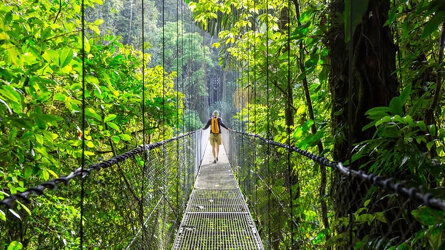
Launching in 1981, Explore offer trips from over 130 countries - from classic small group tours. Read more
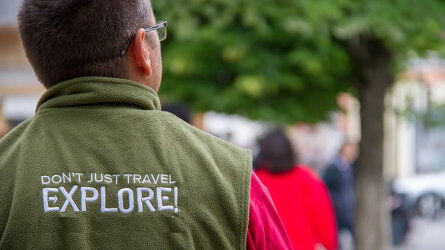
Explore's leaders are more than just your typical guide. They're your local expert are are passionate about sharing their expertise with you. Read more
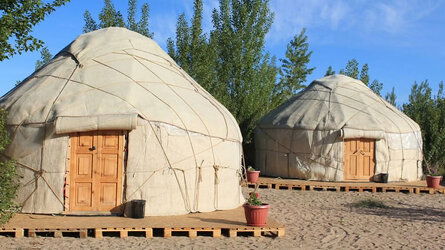
The places Explore stay are every bit as important as the sights they visit and the things you do. Read more

Launching in 1981, Explore offer trips from over 130 countries - from classic small group tours. Read more

Explore's leaders are more than just your typical guide. They're your local expert are are passionate about sharing their expertise with you. Read more

The places Explore stay are every bit as important as the sights they visit and the things you do. Read more
Brochure
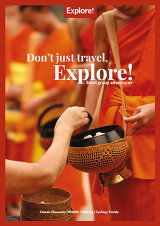
Explore Small Group Adventures (2024-25)
Brochure

Explore Small Group Adventures (2024-25)
Availability
A definite departure means minimum numbers have been reached for this departure to operate. Your Global Journeys Travel Advisor will check the availability of your departure date when you enquire. Additional savings may apply. We guarantee the lowest price in Australia. T&C’s apply.
Tour & cruises prices are per person. Prices shown have savings applied, are subject to availability and may be withdrawn at any time without notice. Prices and trip information are correct at the time at this point in time, however are subject to confirmation at the time of booking and are subject to change by Explore. For cruise itineraries, cabin images are sourced from Explore. These should be treated as indicative only. Cabin inclusions, upholsteries and room layout may differ to the image(s) shown depending on the ship selected and your sailing dates.
